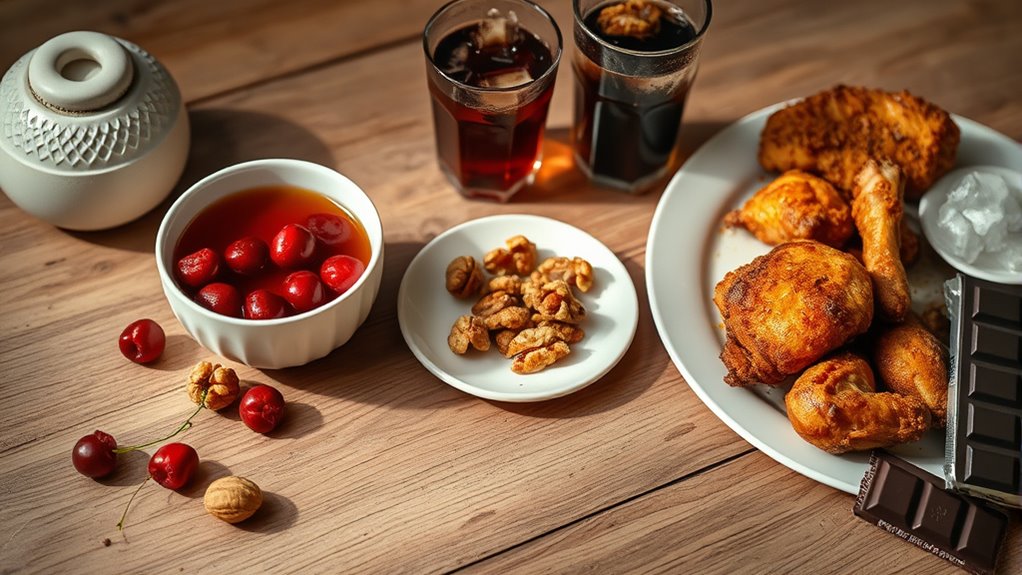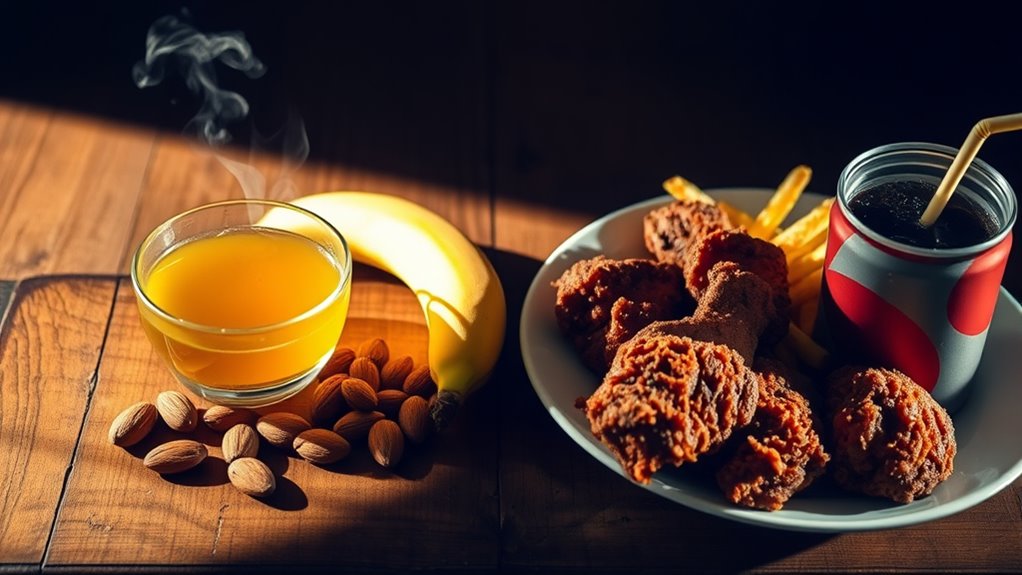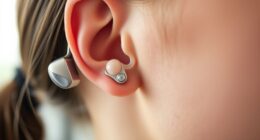To improve your sleep, focus on foods rich in tryptophan like turkey, chicken, nuts, and seeds, which help produce sleep-inducing chemicals. Eat light dinners a few hours before bed and avoid caffeine, sugary snacks, and heavy meals close to bedtime, as they can cause wakefulness or discomfort. Alcohol may make you sleepy initially but disrupts your sleep cycles later. Proper hydration and meal timing can make a big difference—discover more tips to sleep soundly tonight.
Key Takeaways
- Foods rich in tryptophan, such as turkey and nuts, promote sleep by increasing serotonin and melatonin production.
- Caffeinated beverages and sugary snacks disrupt sleep by delaying onset and causing restless nights.
- Large, heavy meals before bed interfere with sleep due to digestion discomfort and acid reflux.
- Alcohol may induce initial sleepiness but ultimately fragments sleep and reduces REM stages.
- Excessive fluid intake at night causes awakenings, while proper hydration supports overall sleep quality.

Getting a good night’s sleep often depends on what you eat. The foods you choose can influence your sleep cycle, either helping you drift off easily or causing disruptions that keep you awake. Your dietary habits play a fundamental role in setting the stage for restful sleep, so it’s important to understand which foods support your body’s natural rhythms and which ones interfere. When your diet aligns with your sleep needs, you’re more likely to experience deeper, more restorative sleep each night.
Certain foods contain nutrients that promote the production of sleep-inducing chemicals like serotonin and melatonin, which help regulate your sleep cycle. For example, foods high in tryptophan—such as turkey, chicken, nuts, and seeds—can boost these calming hormones. Carbohydrate-rich foods also help by increasing the availability of tryptophan in your brain, making it easier to fall asleep. Incorporating these into your evening meals can set a positive tone for the night ahead. On the other hand, caffeine and sugar are notorious for disrupting your sleep cycle. Caffeinated drinks like coffee, tea, and energy drinks can stay in your system for hours, delaying sleep onset and reducing sleep quality. Similarly, sugary snacks and desserts can cause fluctuations in blood sugar levels, leading to wakefulness or restless sleep.
Foods rich in tryptophan and complex carbs support sleep, while caffeine and sugar disrupt your sleep cycle.
Your dietary habits don’t just influence what you eat, but also when you eat. Eating large or heavy meals close to bedtime can interfere with your sleep cycle because digestion requires energy and can cause discomfort or acid reflux. It’s better to have a light dinner a few hours before bed, giving your body enough time to process the food. Consuming alcohol might initially make you feel sleepy, but it often disrupts your sleep cycle later in the night, causing fragmented sleep and reducing REM stages, which are essential for mental and emotional restoration. Additionally, timing of meals can significantly impact sleep quality by aligning your eating schedule with your body’s natural rhythms.
Hydration also plays a role; drinking excessive fluids before bed can lead to frequent trips to the bathroom, disturbing your sleep. Conversely, dehydration can cause discomfort and make it harder to fall asleep. By adjusting your dietary habits—choosing sleep-friendly foods, avoiding stimulants, and timing your meals appropriately—you can better support your sleep cycle. Remember, consistency is key. Making small, conscious tweaks to your diet can markedly improve your sleep quality over time, helping you wake up feeling refreshed and ready for the day.
Frequently Asked Questions
Can Certain Foods Help Me Fall Asleep Faster?
Yes, certain foods can help you fall asleep faster. Try sleep-inducing snacks like almonds or bananas, which contain magnesium and tryptophan. Relaxing beverages such as chamomile tea or warm milk also promote relaxation. Incorporating these into your evening routine may improve your sleep onset. Avoid heavy or sugary foods close to bedtime, and opt for light, calming options to set the stage for restful sleep.
Are There Foods That Cause Nightmares?
Ever wonder if certain foods could turn your dreams into nightmares? Some dream inducing foods and nightmare triggers, like spicy dishes, caffeine, or heavy, fatty foods, can disrupt your sleep and may lead to vivid or disturbing dreams. These foods increase brain activity or cause discomfort, making nightmares more likely. To avoid unsettling dreams, steer clear of these triggers before bed and opt for calming, sleep-friendly snacks instead.
How Do Caffeine and Sugar Affect Sleep Quality?
Caffeine’s effects can markedly disrupt your sleep by blocking adenosine, making it harder to fall asleep and reducing sleep quality. Sugar impact is similar; consuming too much sugar before bed causes spikes in blood sugar that lead to wakefulness and fragmented sleep. To improve your sleep, limit caffeine intake in the afternoon and cut back on sugary snacks at night, giving your body a better chance to rest and recover.
Can Eating Late at Night Disrupt My Sleep Cycle?
You might not realize it, but late-night snacking can disrupt your sleep cycle; studies show that eating within two hours of bedtime can decrease REM sleep by up to 20%. Your meal timing matters—late-night eating triggers digestion when your body should be winding down, making it harder to fall asleep and stay asleep. To improve sleep quality, try to finish meals at least 2-3 hours before bed.
Are There Specific Foods for Better REM Sleep?
Yes, certain foods can enhance your REM sleep by supporting sleep hormone regulation and nutrient absorption effects. Foods rich in tryptophan, magnesium, and melatonin, like nuts, seeds, and cherries, help your body produce better sleep hormones. Consuming these a few hours before bed promotes deeper REM sleep, making you feel more rested. Avoid heavy meals, as they can interfere with sleep hormone balance and nutrient absorption, disrupting your sleep cycle.
Conclusion
By choosing foods that promote restful sleep and avoiding those that disrupt it, you can transform your nights and improve your days. Prioritize calming teas and sleep-supporting snacks, while steering clear of caffeine and heavy meals before bed. Make mindful choices, create a bedtime routine, and embrace a healthier sleep pattern. Remember, what you eat influences how you sleep, how you wake, and how you face each new day—so choose wisely, sleep soundly, and live fully.









